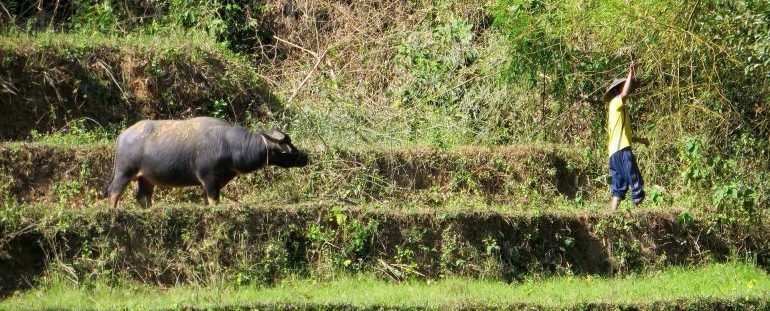
Since the adoption of the UN Declaration on the Rights of Peasants and Other People Working in Rural Areas in December 2018, the international peasant movement – La Via Campesina (LVC) – has thrown itself into a new campaign for the implementation of the Declaration.
As a long-standing partner of LVC in the defence of peasant family farming, CETIM plays an active and prominent role in efforts to promote the Declaration, particularly at the international level and within the UN. We are well aware that the road to the realization of peasants’ rights will be a long and rocky one. Agribusiness continues to tighten its powerful monopoly on food systems around the world. Moreover, the sector’s impact on government policies (influence peddling) is a major and growing problem. The very core of its strategy is to make public institutions serve its interests. Influence peddling – which puts profits and shareholders before the human rights of peoples and citizens – represents a real challenge for the realization and implementation of peasants’ rights.
Despite this complex and seemingly unfavourable context, the struggle of the international peasant movement and its allies is gaining in strength and peasants’ rights are beginning to be realized at different levels. This is the result of the mobilization of peasants’ organizations in several countries, publicizing the Declaration, educating their members on its content and use, and demanding that the authorities in those countries implement peasants’ rights. And we can see that in several countries legislation is being drafted in the light of the provisions of the Declaration (e.g. Nepal’s Peasants’ Rights Act). Similarly, more and more court cases and rulings are based on those provisions (e.g. a Canadian court judgement on the rights of rural migrant workers). All of which shows that the implementation of the Declaration is well and truly under way.
Action within the UN
CETIM and its partners advocate the creation of an international monitoring mechanism for the Declaration, in the form of a new special procedure of the UN Human Rights Council. Its task will be to monitor the implementation of the Declaration at the national and the international levels. The mechanism will thus provide political and legal leverage to back up the effective implementation of the rights enshrined in the Declaration. To achieve this goal, CETIM and its partners have organized several events in the UN and have taken the floor in various UN bodies.
For example, at the 50th session of the UN Human Rights Council in June 2022, LVC, CETIM, FIAN International, the South Centre, the Office of the United Nations High Commissioner for Human Rights and three diplomatic missions (Bolivia, South Africa and Luxembourg) organized a conference on the implementation of the Declaration. It was the first event of this kind since 2018. It was a great success, and the breadth and diversity of countries and stakeholders attending showed that the promotion of the Declaration is on the agenda at the UN and a priority.
Again, to ensure that its voice was heard at the World Trade Organization (WTO) Ministerial Summit, also in June 2022, LVC sent a nearly 40-strong delegation to Geneva. In this case CETIM and the peasants’ delegates lobbied the diplomatic missions of their respective States to get them to back efforts to implement the Declaration, and in particular to support the establishment of an international monitoring body.
Then, during the 51st session of the Human Rights Council, in September 2022, another LVC delegation came to Geneva to continue lobbying and laying the groundwork for the creation of that mechanism. (see article)
On 3-4 November 2022, CETIM and LVC attended the Social Forum. This is an annual meeting convened by the Human Rights Council which aims to “promote social cohesion based on the principles of social justice, equity and solidarity, as well as to address the social dimension and challenges of the ongoing globalization process”. This year’s Social Forum focused on achieving the goals of the International Decade of Action, “Water for Sustainable Development”, 2018-2028. So it was an appropriate event at which to argue for greater ownership of the Declaration as a key instrument for the promotion of economic and social rights, which tend to be sidelined by neoliberal globalization forces. The LVC and CETIM speakers described the important role peasant family farmers play in water management and underlined the importance of the Declaration as a roadmap for confronting the climate crisis. Also during the Social Forum, CETIM and its partners organized a conference on the right to water, which discussed how that right is intrinsically bound up with the rights of peasants and with sustainable food systems.
We hope that in 2023 the Human Rights Council will move towards the creation of this international monitoring mechanism and that the new body will effectively help to make peasants’ rights a tangible reality on the ground.
Information and training: a website on the Declaration
As has been said before, the realization of peasants’ rights also requires an enormous effort of information and training. To this end, LVC, CETIM, FIAN International and the Geneva Academy have been working for a year on a project to set up a website devoted entirely to the promotion of the Declaration: DEFENDING PEASANTS’ RIGHTS. Platform of rural struggles in action! The site will be officially launched in December 2022.
It will serve as a collective learning and advocacy platform for peasants’ rights. It is intended as a space in which to collect and disseminate information and training materials, examples of implementation of the Declaration, legislative and policy developments, and legal cases touching on this issue. The aim is to make peasant movements’ strategies for struggle available to a wide audience, and also to help coordinate organizations and movements with similar attitudes towards changing the world’s agri-food systems, i.e., that strive to do so in a way that respects the environment, biodiversity and peasants rights, and whose starting point is one of social and climate justice.